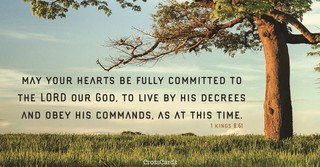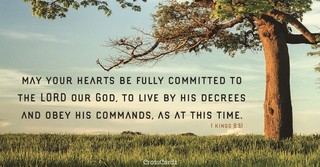
- Recent Translations
- All Translations
1 Kings 8
Share
Settings
1 Kings 8 Commentary
Chapter 8
The dedication of the temple. (1-11) The occasion. (12-21) Solomon's prayer. (22-53) His blessing and exhortation. (54-61) Solomon's peace-offerings. (62-66)
Verses 1-11 The bringing in the ark, is the end which must crown the work: this was done with great solemnity. The ark was fixed in the place appointed for its rest in the inner part of the house, whence they expected God to speak to them, even in the most holy place. The staves of the ark were drawn out, so as to direct the high priest to the mercy-seat over the ark, when he went in, once a year, to sprinkle the blood there; so that they continued of use, though there was no longer occasion to carry it by them. The glory of God appearing in a cloud may signify, 1. The darkness of that dispensation, in comparison with the light of the gospel, by which, with open face, we behold, as in a glass, the glory of the Lord. 2. The darkness of our present state, in comparison with the sight of God, which will be the happiness of heaven, where the Divine glory is unveiled.
Verses 12-21 Solomon encouraged the priests, who were much astonished at the dark cloud. The dark dispensations of Providence should quicken us in fleeing for refuge to the hope of the gospel. Nothing can more reconcile us to them, than to consider what God has said, and to compare his word and works together. Whatever good we do, we must look on it as the performance of God's promise to us, not of our promises to him.
Verses 22-53 In this excellent prayer, Solomon does as we should do in every prayer; he gives glory to God. Fresh experiences of the truth of God's promises call for larger praises. He sues for grace and favour from God. The experiences we have of God's performing his promises, should encourage us to depend upon them, and to plead them with him; and those who expect further mercies, must be thankful for former mercies. God's promises must be the guide of our desires, and the ground of our hopes and expectations in prayer. The sacrifices, the incense, and the whole service of the temple, were all typical of the Redeemer's offices, oblation, and intercession. The temple, therefore, was continually to be remembered. Under one word, "forgive," Solomon expressed all that he could ask in behalf of his people. For, as all misery springs from sin, forgiveness of sin prepares the way for the removal of every evil, and the receiving of every good. Without it, no deliverance can prove a blessing. In addition to the teaching of the word of God, Solomon entreated the Lord himself to teach the people to profit by all, even by their chastisements. They shall know every man the plague of his own heart, what it is that pains him; and shall spread their hands in prayer toward this house; whether the trouble be of body or mind, they shall represent it before God. Inward burdens seem especially meant. Sin is the plague of our own hearts; our in-dwelling corruptions are our spiritual diseases: every true Israelite endeavours to know these, that he may mortify them, and watch against the risings of them. These drive him to his knees; lamenting these, he spreads forth his hands in prayer. After many particulars, Solomon concludes with the general request, that God would hearken to his praying people. No place, now, under the gospel, can add to the prayers made in or towards it. The substance is Christ; whatever we ask in his name, it shall be given us. In this manner the Israel of God is established and sanctified, the backslider is recovered and healed. In this manner the stranger is brought nigh, the mourner is comforted, the name of God is glorified. Sin is the cause of all our troubles; repentance and forgiveness lead to all human happiness.
Verses 54-61 Never was a congregation dismissed with what was more likely to affect them, and to abide with them. What Solomon asks for in this prayer, is still granted in the intercession of Christ, of which his supplication was a type. We shall receive grace sufficient, suitable, and seasonable, in every time of need. No human heart is of itself willing to obey the gospel call to repentance, faith, and newness of life, walking in all the commandments of the Lord, yet Solomon exhorts the people to be perfect. This is the scriptural method, it is our duty to obey the command of the law and the call of the gospel, seeing we have broken the law. When our hearts are inclined thereto, feeling our sinfulness and weakness, we pray for Divine assistance; thus are we made able to serve God through Jesus Christ.
Verses 62-66 Solomon offered a great sacrifice. He kept the feast of tabernacles, as it seems, after the feast of dedication. Thus should we go home, rejoicing, from holy ordinances, thankful for God's Goodness
1 Kings 8 Commentaries
Chapter Summary
INTRODUCTION TO 1 KINGS 8
This chapter gives an account of the introduction of the ark into the temple, 1Ki 8:1-9 of the glory of the Lord filling it, 1Ki 8:10,11 of a speech Solomon made to the people concerning the building of the temple, and how he came to be engaged in it, 1Ki 8:12-21, of a prayer of his he put up on this occasion, requesting, that what supplications soever were made at any time, or on any account, by Israelites or strangers, might be accepted by the Lord, 1Ki 8:22-53, and of his blessing the people of Israel at the close of it, with some useful exhortations, 1Ki 8:54-61, and of the great number of sacrifices offered up by him, and the feast he made for the people, upon which he dismissed them, 1Ki 8:62-66.
